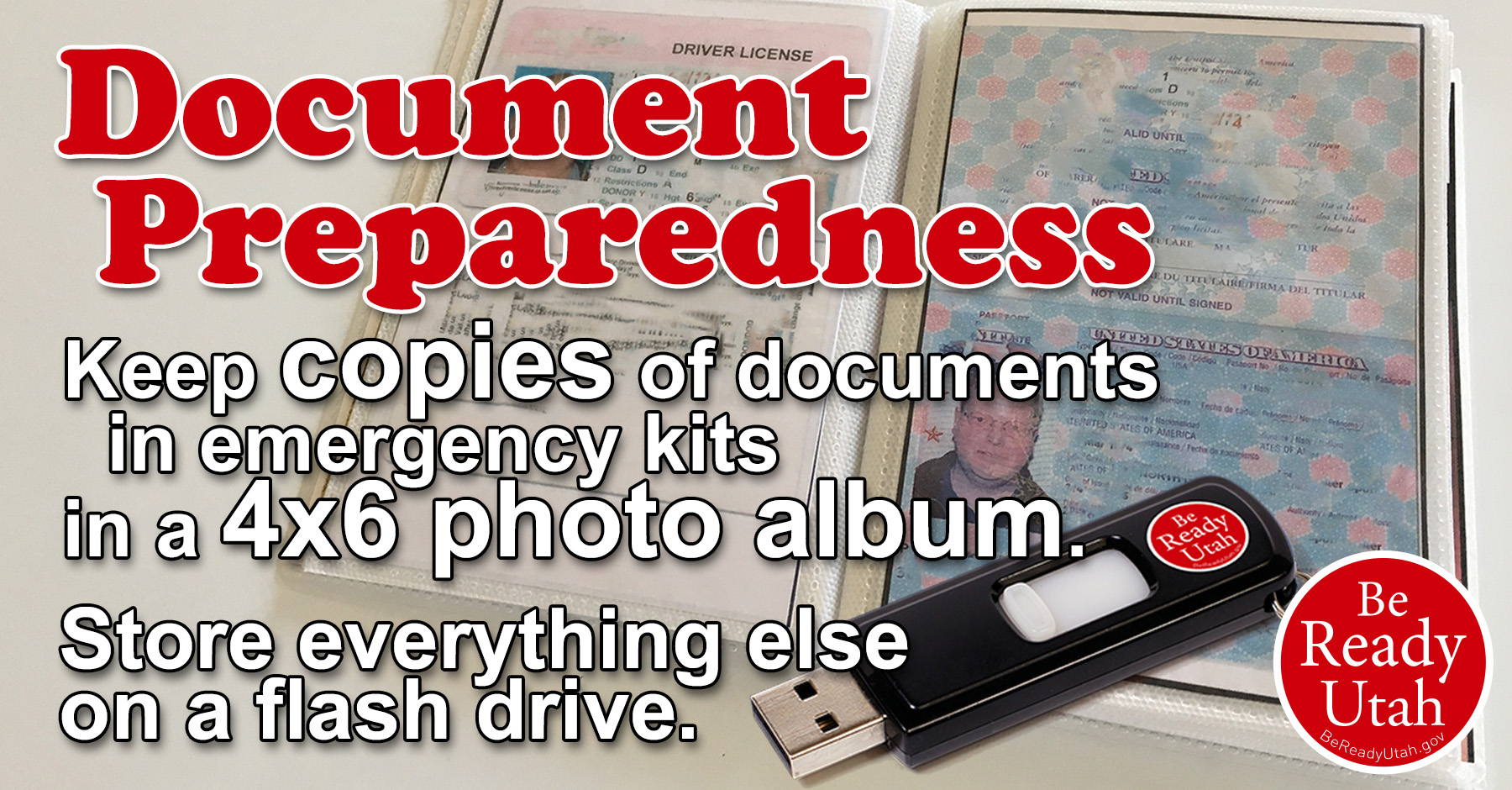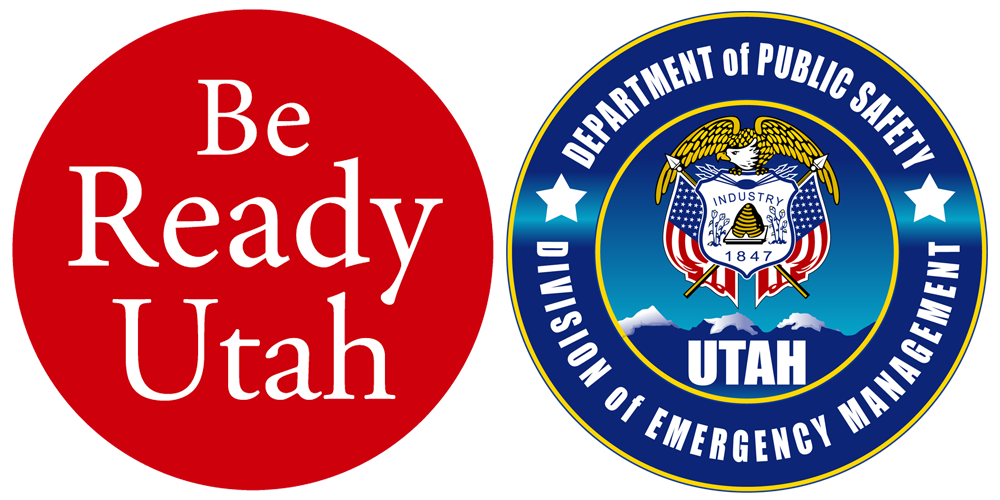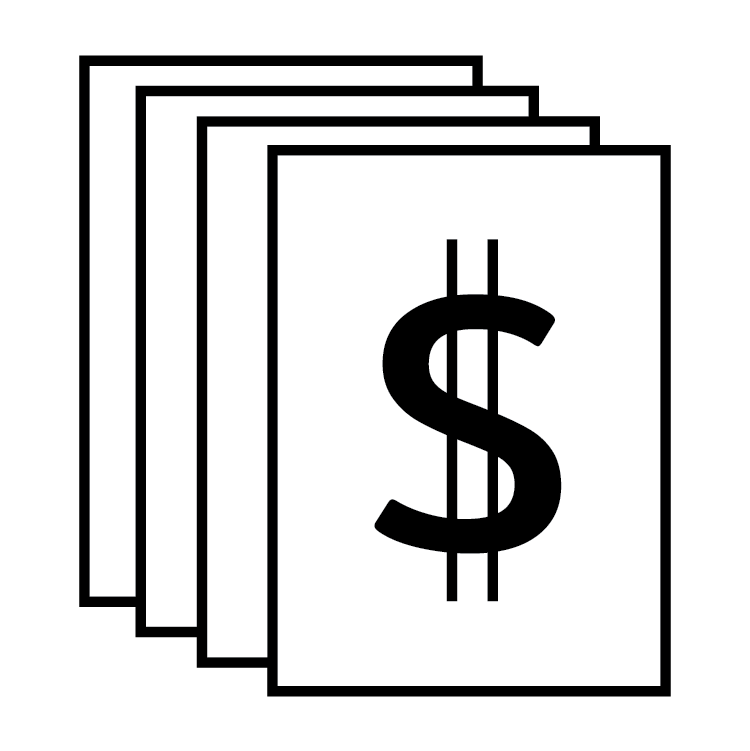
Important Documents and Money
The Point
It is important to have printed copies of documents for identification and reference during an emergency and to help in post-emergency recovery. At the same time, during disasters, ATM machines, banks, and credit card readers may be inoperable. Having cash on hand will help cover costs until normal services resume.
It is important to have your important documents in order and have some finances set aside to "be ready" for emergencies and hard times.
Do This
- Gather and make copies of your important documents and put the originals in a fire/water proof safe or safe deposit box.
- Put COPIES of important documents in disaster supply kits.
- Secure digital copies of important documents in a secure cloud account.
- Put together an ICE (In Case of Emergency) finance book.
- BONUS: Include in your budget a percentage of each check until you have at least a $1000.00 emergency fund. Keep the cash in small bills and store it with your important documents in the safe.
Videos
Downloads
- Important Documents
- Top 10 Preparedness on a Budget
- Insurance Coverage Review Template
- Questions to Ask Yourself and Your Bank
- Checklist of Important Documents for Your Continuity Vault
- Guide for Determining Vital Records
- Vital Information Checklist
- Vital Records Tracker Template
- FEMA: Emergency Financial First Aid Kit
- FEMA: Safeguard Critical Documents and Valuables
- FEMA: Document and Insure Your Property
- FEMA: Save Your Family Treasures: Photographs
- FEMA: Save Your Family Treasures: Books
- FEMA: Save Your Family Treasures: Documents and Papers
- FEMA: After the Fire: Advice for Salvaging Damaged Family Treasures
- FEMA: After the Flood: Advice for Salvaging Damaged Family Treasures
- FEMA: Salvaging Water-Damaged Family Valuables and Heirlooms
- CFPB: Your Disaster Checklist
- SLPD: ATM Safety and Security
- Red Cross - Disasters and Financial Planning
- VOAD - Personal Disaster Preparedness Guide
Links
- Disaster Supply Kit: Important Documents and Money
- USU Ext: Emergency Cash Stash
- FEMA: Save Your Family Treasures
- Consumer.gov: Avoiding Identity Theft
- Consumer.gov: Recovering from Identity Theft
- The Family Financial Toolkit
- Ready.gov Financial Preparedness
- Consumer Finance - Dealing with Disasters and Emergencies
- SBA Disaster Loans
- Settling Insurance Claims After a Disaster
- How to Replace Important Papers
- When Disasters Strike: Pay, Leave and Related Issues
- Disaster Preparedness For Your Finances
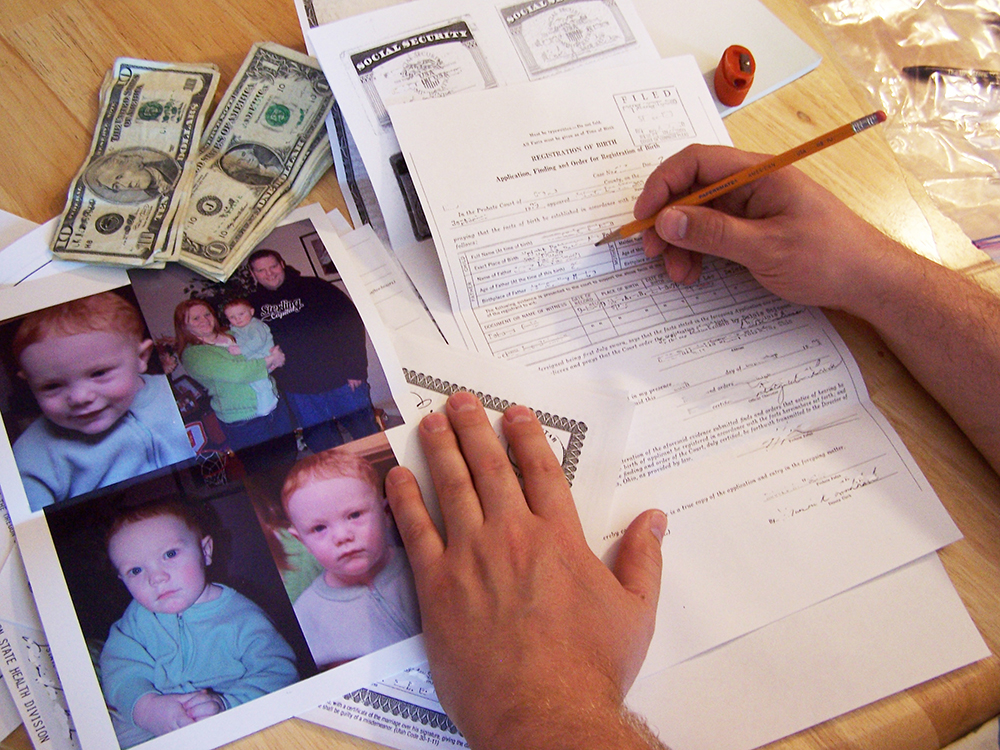 In our modern society, we have documentation for everything. We have documents to prove who we are, where we're from, what we own, what we've done, and what we know and can do. Having important documents updated, ready, and accessible and some cash on hand are necessary parts of being ready for emergencies.
In our modern society, we have documentation for everything. We have documents to prove who we are, where we're from, what we own, what we've done, and what we know and can do. Having important documents updated, ready, and accessible and some cash on hand are necessary parts of being ready for emergencies.
Documents
Having important documents when you need them help with identification, remembering account numbers and passwords, proof of ownership, getting relief assistance, and rebuilding. Originals documents should be stored in a fireproof/waterproof safe or in a safety deposit box.
Routinely make a copy of all computer files on an external hard drive. Store the hard drive in a safe place that can be quickly grabbed in an emergency. Many on-line back-up companies are inexpensive and can be used for personal or company business data. Add videos, documents, and pictures into your data back-ups. Routinely back-up all computer files with an off-site, on-line or “cloud” data storage company. If your home and computer are destroyed, your data won’t be. It is also important to have printed copies of documents for identification and reference during an emergency and to help in post-emergency recovery. These can be stored in a water-proof/fire-proof safe at the home of a trusted relative or friend.
Also have printed copies in your disaster supply kit of the information you will need for identification and communication during an emergency and digital copies of everything else on a password protected flash-drive. Update your information whenever it changes and review it every six months.
Some important documents you should have in a secure place include: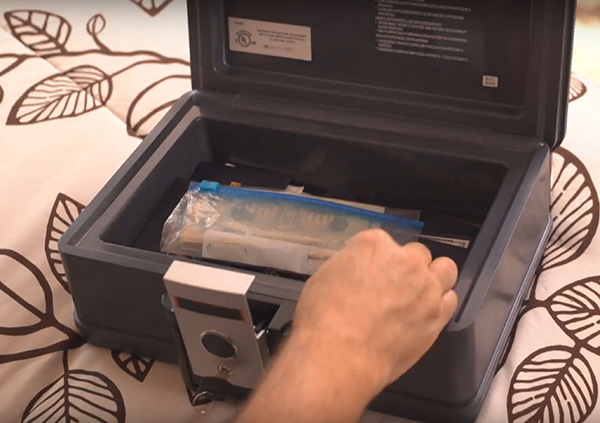
- Insurance policies for home, life, auto, medical, flood, earthquake, and any other insurances you may hold. Include policy numbers, insurance agents, and contact information.
- Marriage and birth certificates
- Social Security cards and records
- Passport and immigration records
- Vehicle titles and copies of registration. It's also a good idea to have a picture of you in front of the car with the license plate visible.
- Mortgage documents, house appraisal, and house title
- Wills, memorial guides, and powers of attorney for medical care, children, businesses, estate, etc. in the event of incapacitation or death
- Personal property inventory including make and model with pictures and/or video. Video allows you to talk about the items in your inventory as you record..
- Diplomas and other school certificates
- Military certificates, medals, and records
- Immunization records, prescriptions, Medicare/Medicaid, and medical history
- Budget, copies of bills and outstanding debts
- Checking, saving, money market, credit card, stocks, bonds, financial assets, and other financial accounts including account number, user name, password, and financial institution contact information
- Past three years of tax statements
- Website accounts including user name, password, and server information and accounts
- Children's fingerprints
- Genealogy and family history
- Religious documents including blessings, prayers, baptism or other certificates, membership records, etc.
- Current resume
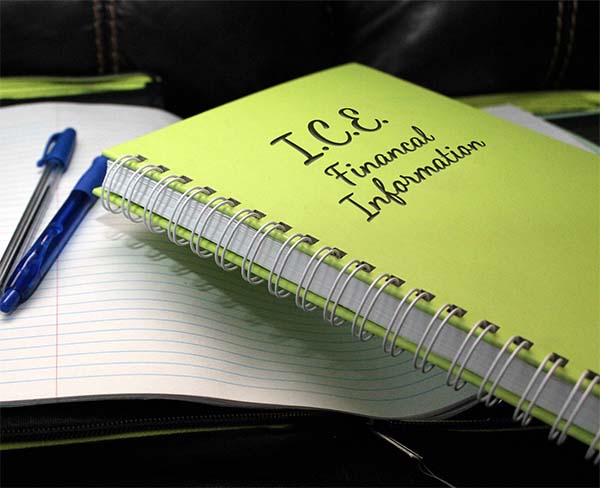
In Case of Emergency (I.C.E.) Book for Finances
ICE Book
Make sure more than one person knows the location of your important documents and how to access them. If one is incapacitated, that information is not lost. Prepare an I.C.E. (In Case of emergency) book with passwords and account information in case the person who has all the financial information becomes incapacitated or dies unexpectedly.
Include passwords, account numbers, financial institution contact information, instructions for paying bills and accessing accounts, safe combinations and locations, and any other important or financial information that would need to be passed on. Make sure that the I.C.E. book is stored in a secured location to protect it from identity theft, but still accessible to those that may need it.
Vital Documents and Whom to Contact About Replacement
Driver’s License - Department of Motor Vehicles
Government Issued ID - Contact the issuing authority
Insurance policies - Your insurance agent or company
Military discharge Papers - Department of Veterans Affairs, 1-800-827-1000 or TDD/TTY 1-800-829-4833
Passports - State Department Passport Services, 202-955-0430 (24 hours)
Birth, death and marriage certificates - Bureau of Records in the appropriate state
Social Security or Medicare cards - Local Social Security office, 1-800-772-1213 or TDD/TTY 1-800-325-0778
Credit cards - The issuing companies as soon as possible
Mastercard, contact issuing financial institution
VISA, contact issuing financial institution
American Express, 1-800-441-0519
Discover, 1-800-DISCOVER, (1-800-347-2683), TDD/TTY 1-800-347-7449
Titles to deeds - Records department of the area in which the property is located
Stocks and bonds - Issuing company or your broker
Wills - Your attorney
Income tax record - The IRS center where filed, your accountant or 1-800-829-1040
Citizenship papers - Bureau of Citizenship and Immigration Services, 1-800-375-5283
Mortgage papers - Lending institution
Money
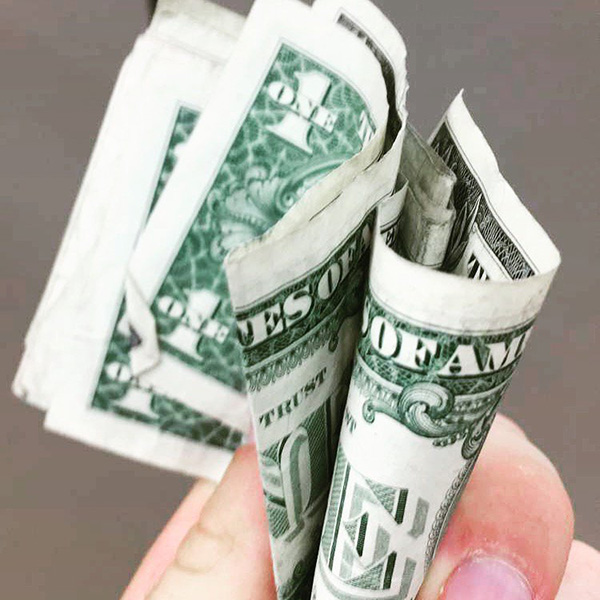 Even in non-emergency times, you need to be careful with your cash, especially in public places. Be aware of your surroundings and watch for prying eyes when you prepare to open your wallet or purse. If you don't feel it is safe to get your money where you are, wait until you are in a safe place. Use credit or debit card when possible to limit the amount of cash you have on your person. Only carry enough cash for the next few transactions.
Even in non-emergency times, you need to be careful with your cash, especially in public places. Be aware of your surroundings and watch for prying eyes when you prepare to open your wallet or purse. If you don't feel it is safe to get your money where you are, wait until you are in a safe place. Use credit or debit card when possible to limit the amount of cash you have on your person. Only carry enough cash for the next few transactions.
If going to the ATM or you are in line at the grocery store, block the view of the keypad with your body or hand as you type in your PIN number. When your transaction is completed, leave immediately. Never stand and count your money.
Studies have shown that most Americans cannot even come up with $400.00 in the event of a personal, family, or community emergency. One of the first things you can do in emergency preparedness is build an emergency financial reserve. Set a goal to work toward having at least $1000.00 in cash, in small bills, stored in a safe with your important documents. This money is for emergency use only.
Set aside a portion of your monthly budget to building this cash reserve. This will help with avoiding payday and car title loans that often create more of a financial emergency than avoid one. You can also use this cash when emergency or disaster prevents you from being able to use credit cards, checks, or cash sharing apps.
In an emergency situation, access to checking, savings, and other financial accounts may be limited. A power outage may cause ATMs to fail and prevent financial institutions from opening. Internet may be down or overloaded preventing use of cash sharing apps. Credit card machines will not be working and some retailers may be reluctant to accept checks during an emergency.
It is best to have a storage of necessary supplies at home. Think ahead. What items will you need in a disaster? Buy now. Remember that everyone is at the store AFTER the storm hits. Necessary items will be unavailable, more expensive, and could be difficult or dangerous to get. Think about some of the crazy videos you have seen on the Black Friday frenzies, and that is just for the last Elmo doll. Imagine how things may get when people are truly desperate for food, water, and medicine. That being said, it is inevitable that you will eventually run out of some supplies or you will have forgotten something. This is why you need to keep a supply of cash in small bills on hand at home and in emergency kits. Keep it secured in a safe place.
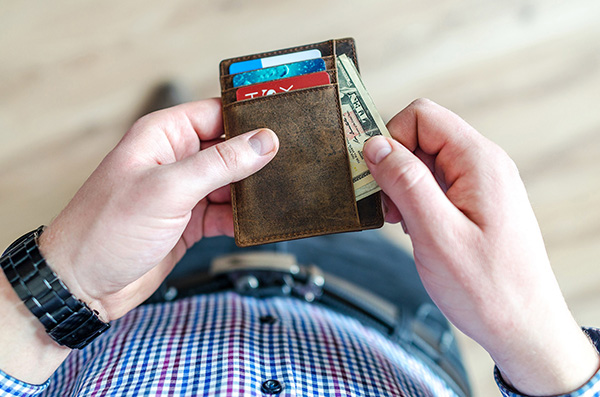 During an emergency situation, if you have to make purchases, only carry a minimum amount of cash in your pockets, enough for your next few transactions. Be careful of prying eyes when pulling out cash, especially during emergencies. Don't make it known that you may have some resources that others might want. In desperate situations, some may be willing to cause harm to others to get what they want.
During an emergency situation, if you have to make purchases, only carry a minimum amount of cash in your pockets, enough for your next few transactions. Be careful of prying eyes when pulling out cash, especially during emergencies. Don't make it known that you may have some resources that others might want. In desperate situations, some may be willing to cause harm to others to get what they want.
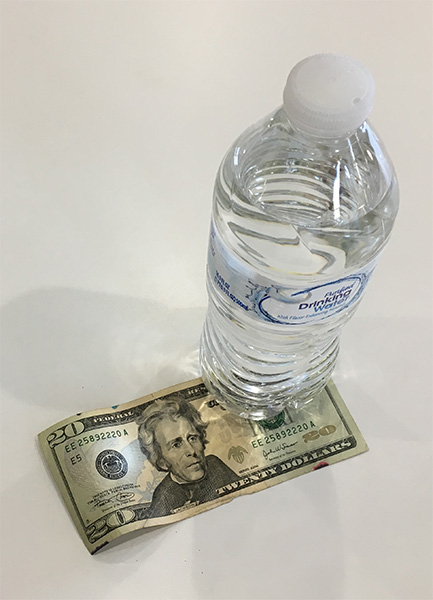 There is a reason to carry small bills, even though they take up more room in your pocket, purse, or emergency kit. Imagine the retail store owners that do most of their transactions, day to day, with debit or credit cards. They keep very little cash or coin on hand for change. Suddenly, their power and internet connections are down. They can no longer run credit cards. They also know that when some people get desperate, they may write checks for money that they don't actually have. Many retailers will not accept checks during emergencies.
There is a reason to carry small bills, even though they take up more room in your pocket, purse, or emergency kit. Imagine the retail store owners that do most of their transactions, day to day, with debit or credit cards. They keep very little cash or coin on hand for change. Suddenly, their power and internet connections are down. They can no longer run credit cards. They also know that when some people get desperate, they may write checks for money that they don't actually have. Many retailers will not accept checks during emergencies.
So this leaves cash. Because cash is bulky, if people carry it, they tend to carry larger bills. This means that the first few cash transactions will deplete the retailers of all of their smaller bills and change. If you don't have any change when you come to make your purchase, you will either buy more than you want or need to make up the extra, or you will overpay for the items you buy. In an emergency when change is scarce, your $1 water bottle is going to cost the price of your lowest bill.
Disaster Supply Kit: Important Documents and Money
Click Here
